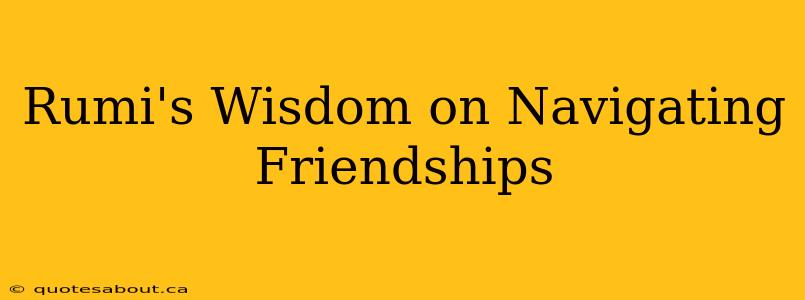Rumi, the 13th-century Persian poet and Sufi mystic, offered profound insights into the human condition, and his wisdom extends deeply into the realm of friendship. His poems and teachings aren't just about romantic love; they explore the complex tapestry of human connection, emphasizing the spiritual significance of genuine friendship. This exploration delves into Rumi's perspective on forging, maintaining, and navigating the challenges inherent in meaningful friendships. We’ll examine his teachings through the lens of modern relationships and address common questions surrounding friendship.
What are the different types of friendships according to Rumi?
Rumi didn't explicitly categorize friendships into distinct types like modern relationship theorists might. However, his poetry hints at different levels of intimacy and spiritual connection. Some friendships are fleeting, based on shared experiences or superficial similarities. Others are profound and transformative, mirroring the soul's journey toward greater understanding and self-discovery. The depth of a Rumi-inspired friendship is measured not by its longevity, but by its capacity to illuminate the soul and foster spiritual growth. This aligns with the Sufi concept of "becoming," where relationships serve as catalysts for personal evolution.
How can Rumi's teachings help improve my friendships?
Rumi's wisdom provides a framework for cultivating meaningful connections. His emphasis on self-awareness is crucial. Before seeking friendships, understand your own needs, strengths, and weaknesses. Rumi's teachings encourage self-reflection, urging us to identify our own shadows and imperfections. This self-awareness fosters authenticity, allowing us to build friendships based on genuine connection rather than superficial expectations. Furthermore, Rumi’s emphasis on forgiveness and compassion are essential for navigating conflicts and misunderstandings, common in any close relationship. Learning to let go of resentment and embrace empathy strengthens the bonds of friendship.
How can I find true friends according to Rumi?
Rumi wouldn't prescribe a formula for finding friends, but his poetry reveals the process as an unfolding of the heart. True friendship, according to Rumi’s perspective, isn't actively sought but rather organically discovered through shared experiences, mutual respect, and a deep connection of spirit. It's about finding those who understand your soul's language, who accept you completely, flaws and all, and who encourage your spiritual growth. This requires vulnerability and openness; being willing to share your true self, even your imperfections, allows for a deeper connection. The search for true friends is, therefore, a journey of self-discovery and the cultivation of inner peace.
What does Rumi say about dealing with difficult friendships?
Even the most cherished friendships encounter challenges. Rumi's approach to conflict centers on compassion and understanding. He doesn't advocate for avoidance but rather for navigating disagreements with empathy and a willingness to see the other person's perspective. Forgiveness, a cornerstone of Rumi's teachings, is crucial in mending fractured relationships. Holding onto resentment only poisons the soul and hinders the potential for reconciliation. Rumi's wisdom guides us to approach difficult friendships with patience, kindness, and a willingness to work through conflict to preserve the valuable connection.
What is the importance of forgiveness in friendships according to Rumi?
Forgiveness is not merely condoning harmful actions; it's a liberating act of self-compassion and the release of emotional burdens. Rumi viewed forgiveness as essential for both personal well-being and the health of relationships. Holding onto anger and resentment creates barriers between individuals, hindering the possibility of reconciliation and growth. By forgiving, we free ourselves from the chains of negativity and create space for healing and understanding. This doesn't mean forgetting hurtful actions, but rather choosing to release the emotional weight they carry. In essence, Rumi sees forgiveness as a necessary component of genuine friendship, essential for maintaining authentic connections and preserving the bonds that enhance our lives.
In conclusion, Rumi’s perspective on friendship offers timeless wisdom that transcends cultural and temporal boundaries. His teachings encourage self-reflection, compassion, and a deep understanding of the spiritual dimension of human relationships. By embracing Rumi's insights, we can cultivate more meaningful, fulfilling, and resilient friendships that enrich our lives and support our journey of self-discovery.

